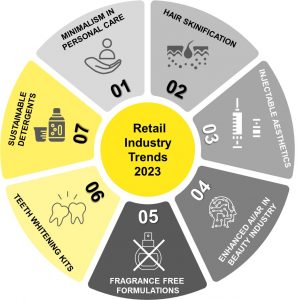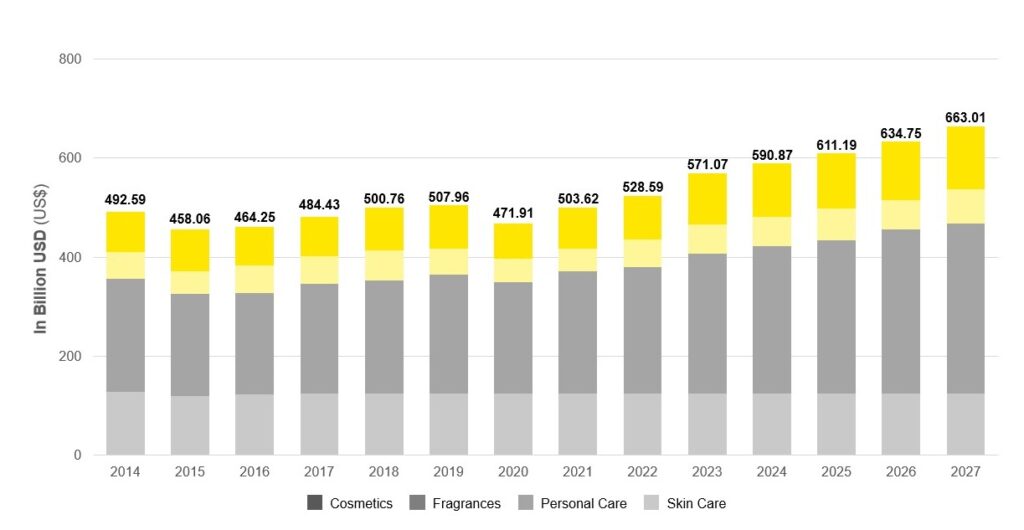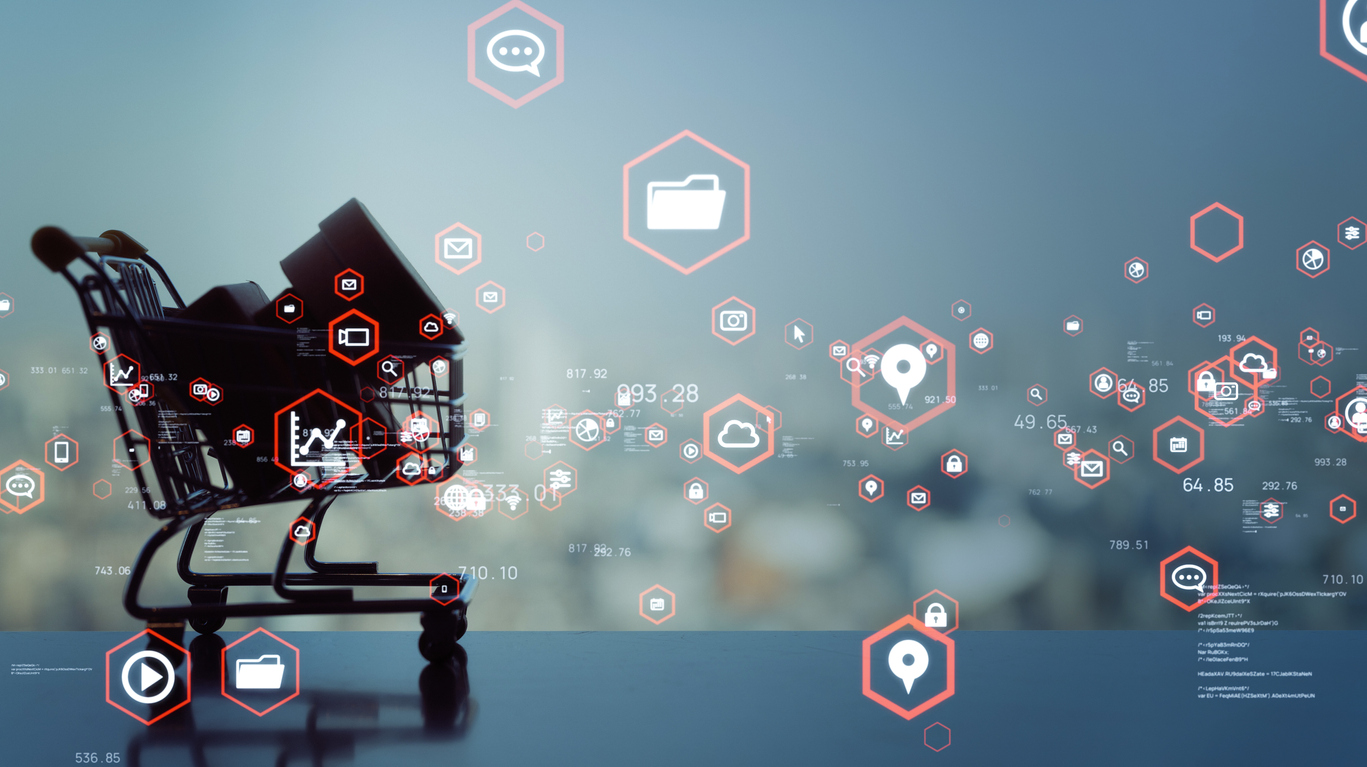Retail Industry Outlook 2023
The retail or fast-moving consumer goods (FMCG) industry is evolving swiftly by observing people’s requirements and casting away loopholes through technology and innovation. Knowing about consumer demands and relentlessly improving quality and products’ shelf life without compromising ethics are some factors pushing the sector. Moreover, cost, quantities of packaged items, and understanding of nomenclature are considered when redesigning products at molecular and surface levels. The year 2023 and beyond will be crucial for the industry.

Figure 1: Retail Industry Trends
Research is instituted on goods like personal care, oral care, household care, laundry care, etc., to offer respite to the end user. The blog highlights the modifications that are likely to happen in retail in the future.
The personal care product market is huge globally. In 2022 alone, it amounts to USD 528.60 billion. It is slated to exhibit an annual growth of 4.64 CAGR (2022-2027), as per Statista. The continuous arrival of new products in improved formulations is winning over consumers.

Figure 2: Size of Personal Care Product Market
Minimalism in Personal Care
FMCG brands that cater to people have a complex way of projecting products. They produce items to tantalize and boost their brand value, betting on users’ unmet requirements.
Minimalism is approaching quickly in personal care products, especially cosmetics, where a single ingredient offers various consumer benefits. Also, minimalism is organic, often gender-neutral, and comes with innovative ingredients. Thus, at the cost of one, many advantages.
Some companies have realized the need and composed two-in-one products, i.e., the benefit of two for the price of one. Notably, BB creams, Micellar water, and dry shampoo have made inroads into the growth through out-of-the-box execution. The year 2023 will see a spike in more provoking product lines.
Skinification of Hair
With the recent trend of skinification of hair, scalp care is gaining popularity, similar to the skincare routine. Previously, hair care was less focused on scalp care and more on treating and repairing damaged hair. Now, there is an awareness that healthy hair starts with a healthy scalp. Basic steps of skincare, such as cleansing, exfoliation, steamers, masking, etc., and nutritional ingredients of skin care are being taken up for scalp and hair care. The scalp is an extension of facial skin, and thus, a personalized care routine is equally essential for shining, bright, and rich hair.
Moreover, it has been found that many hair problems can be taken care of by simply maintaining a healthy scalp. For example, itchy and clogged hair follicles can cause several scalp issues. Hence, cleansing and proper care are the best ways to better hair growth.
However, products used for hair must be sustainable and eco-friendly, and people are following the mantra. Hair nourishment and protection or skinification are happening through serums, oils, shampoos, masks, and conditioners with natural ingredients and no parabens, sulfates, DEA, dyes, silicones, phthalates, etc. 2023 will see a rise in such practices that are good for the environment and personal care.
Injectable Aesthetics
Aesthetic injectables are expanding rapidly in the beauty market. Healthy aging procedures are finding acceptance following growing awareness. Thus, many patients, millennials, and women are rising as a new segment. Moreover, men are also shifting their focus toward wellness and beauty. Thus, acceptance and demand for aesthetic injectables have shot up.
Social media awareness campaigns that dispel the myths surrounding injectables have also helped the growing number of patients receiving the treatment. Furthermore, these aesthetic procedures have become easily accessible and are expanding rapidly globally. Thus, people are latching on to them to improve their facial looks and enhance their bodies.
Artificial Intelligence and Augmented Reality Technology in the Beauty Industry
The beauty industry has become more personalized than ever. As the cost of living has risen, people have been particular about their expenditures. So, they wish to invest in beauty products that benefit them the most. Artificial Intelligence (AI), and Augmented Reality (AR) help p up the correct products out of a range, thus enabling personalization options for the customers. Everyone’s skin type and tone are different. Also, their issues and requirements are distinct from each other. So, the correct knowledge about skin type and what ingredients are best suited for one assists buyers in making the right decision regarding beauty product selection.
Shopping has become more accessible and targeted at shoppers and sellers. Consumers have several options, including try-on matching shades using a skin diagnostic selfie experience to help them know the required fit according to their personality traits. Moreover, it aids brands with a smooth omnichannel strategy to sell the product.
Fragrance-free Formulations in Home & Personal Care
Allergies are surfacing due to commercial soaps, shampoos, and detergents that can exceed skin disorders like eczema, psoriasis, etc. Fragrances have always been questioned for the ingredients and compounds used to prepare them. Traditional scents with chemicals react badly with the skin, offering redness, rashes, and sensitivity.
Fragrance-free products are sans any artificial or natural fragrance. Also, they are devoid of masking agents to cast away foul odors. Thus, the potential to cause harm to the body is negligible for the user.
Products with dual compounds that offer anti-bacterial properties and no fragrance (eco-friendly and sustainable) are trending these days. Personal-care companies are conducting more R&D to launch such fragrance-free formulations.
Retail Industry: Teeth Whitening Kits
Earlier, patients had to visit dentists for teeth whitening treatment. Home-based, consumer-friendly teeth whitening kits were unavailable to the masses. However, the time has changed.
Look-enhancing kits are making rounds, and what better than white and bright teeth? Your smile captures one’s attention. So, teeth whitening products find takers and freshen up the smile; consumers are spending money on them. Peroxide cleaning kits can see a hike in purchases. Moreover, teeth whitening strips offer good results to users, and the demand will increase in the coming days.
Furthermore, LED whitening kits are also popular these days and will find many buyers in 2023—the light aids in activating teeth-whitening agents. You can find two whitening agents: a non-bleach solution removes stains on the surface, and the bleach solution works beneath the teeth’ surface. A fitting tray is applied to the front teeth before using the solution.
Retail Industry: Plastic–free Detergents
Microplastic and microfiber in detergents are hazardous for land and water. It washes away to oceans through sewage and other water bodies and pollutes them, making it difficult for marine animals to survive. So, fish that consume them get intoxicated, and people who eat them suffer serious implications. Notably, several names are there that mislead consumers with their names. However, 2023 is set to witness no compromise with plastic in detergents. It will look forward to finding sustainable and organic alternatives that do not cause consequences to animals, birds, and the environment.
Detergent that Degrades in Water
Harmful detergents are causing a massive headache as drinking water accounts for less than 1 percent of the total, and the wastewater flows down the drain, polluting it. Surfactants are organic compounds mainly responsible for spreading pollution through sewage. The introduction of microorganisms can evolve biochemical pathways to develop detergents that degrade in water without contaminating it. In the future, many manufacturers will take technology into account.
Retail Industry: Reduction of Microplastic by Washing Machine
Microplastic is a primary global concern, and the world is already struggling with global warming and greenhouse gas emissions. Several washing machine manufacturers are working on reducing microplastic during laundry. Samsung has guaranteed to eliminate microplastic by 54 percent while maintaining the clothes’ quality. The company’s proprietary Ecobubble aids laundry detergent in getting absorbed and dissolving swiftly. The process washes away all stains and dirt. Thus, clothes’ abrasion is minimized, and the leading cause of microplastic shedding stops.
Laundry Detergent Enzymes to Increase Sustainability
Conventional detergent flushes into oceans and seas, polluting corals and living beings. The biodegradable aspect of detergent enzymes is what the future is lurking for. The sustainability aspect is witnessing the dawn of detergent enzymes.
Sustainable detergents contain naturally available element enzymes. Notably, enzymes are a part of every living organism that helps digest food and create a chemical process, turning that into energy. The common enzymes in such detergents are protease and lipase, which aid in breaking oil, fat, starch, and protein from clothes and keep them clean. Moreover, another enzyme that works effectively is cellulase, which offers brightening fabrics compared to a bleaching agent. It makes clothes look fresh by removing dust and dirt clinically.
So, laundry detergent with enzymes will find a place in households in 2023 and beyond.
Metaverse in Retail
With the advent of advancements in the e-commerce sector, everyone is capitalizing on digital platforms for growth. After using augmented realities by goods manufacturers and suppliers to heighten the retail business prospect, metaverse technology is finding many takers. It is helping improve customer engagement and enhance their experiences.
Metaverse is aiding brands and industries in understanding customer behaviors and requirements through monitoring and taking the liberty to develop products around their needs. Also, they are developing relationships through innovation and creativity using metaverse technology. It helps in creating a bridge between the physical and the virtual world.
Unilever and Coca-Cola have introduced their respective products using this technology.
Smart Store Automation with AI in Retail
Like any other industry, retail is transforming quickly. Artificial intelligence has blossomed and taken conventional business tycoons by surprise. People might soon see several unmanned stores. AI in retail stores will reduce the workforce burden on the owners. It will enable adding more products, and the smart store will open for longer hours.
The AI-driven POS will be able to recognize people’s needs and offers they like and provide a large perspective to people in business. Furthermore, it will help improve customer personalization, drawing more consumers to the store. Moreover, owners will save money on the space for cashiers’ counters construction.
Retail Industry: Conclusion
Personal care or home care brands are working on formulations that are good for the skin and environment. Research has been going on the molecular level to make products aesthetic and free from organic chemicals. The motive is to make products that do not cause health hazards and are free from plastics and acids, in which people from different ethnicities can participate.
The product line is witnessing a paradigm shift. Technologies like AI, AR, and metaverse are bringing innovation in the optimum utilization of products lined up for 2023. Moreover, as the world experiences global warming and increased carbon emissions, plastic-free detergents, fragrance-free formulations, and minimalist personal care offer a ray of hope for the planet’s recovery.



